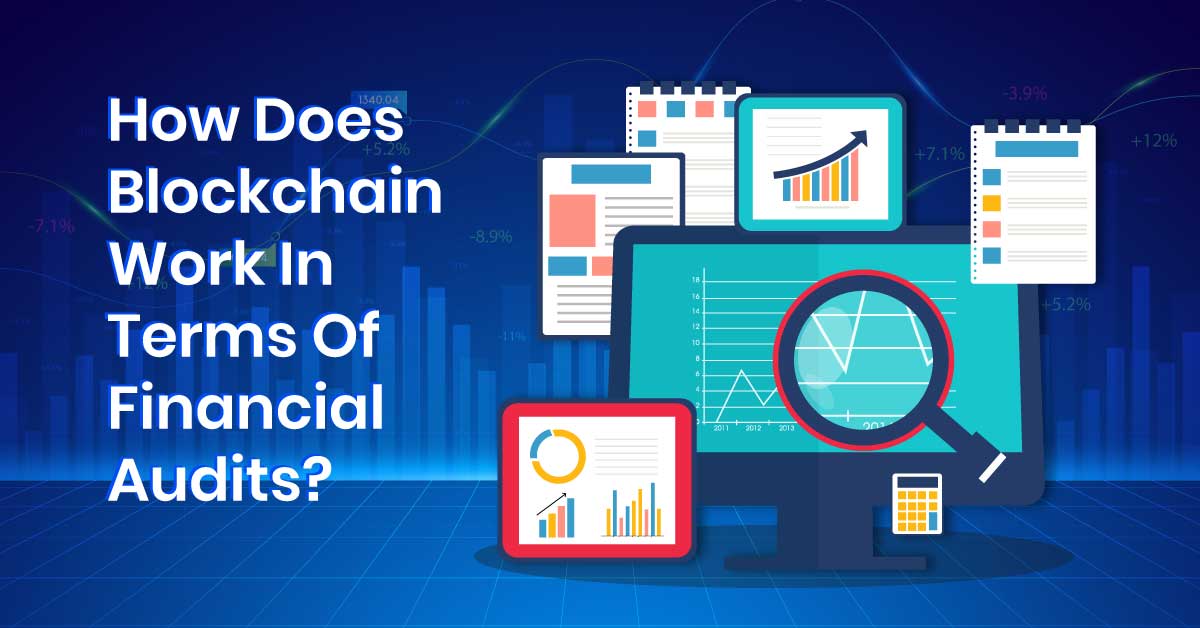How Does Blockchain Work In Terms Of Financial Audits?
As a prominent technology, blockchain has a wide array of qualities the tools that are based on this technology are not so easy to breach, everything is stored in real-time, and all the data cannot be altered without authorization.

One thing that is common in all of these features is trust. Undoubtedly, the technology is reliable–the reason for so many use cases, it has in fields like public welfare, NFT transactions, supply-chain management, finance, and more. However, getting your smart contracts audited by the best Blockchain security audit company can ensure to keep hacks away from your projects! So, make sure you do not deploy any project before an experienced auditor goes through it completely, thus, preventing you from future hacking exploits.
Among different fields that are influenced by blockchain technology, financial auditing is one of the most important ones. It has been observed that major businesses often face challenges in validating the integrity of transactions. Using blockchain in financial services and functions contributes immensely to solving these problems for auditors and businesses worldwide.
There is an amazing relationship between blockchain technology and financial auditing. Are you curious enough to know them? Worry not, as we will unleash it for you. This blog will talk about the different ways by which blockchain technology can affect financial auditing.
How Does Blockchain Enhance Financial Auditing?
Blockchain has revolutionized the financial auditing process. Primarily, these are the three ways by which blockchain has enhanced financial auditing.
Facilitating real-time auditing and automated financial operations
Traditionally, audits happen at the end of the financial year–auditors and CAs verify transactions, balance sheets, cash flow statements, and other documents. It gives them the opportunity to find the problematic areas within the firm and fix them.
With the upsurge of blockchain technology in financial services like auditing, it has become easier to verify the transactions in real-time. It has automated the process as soon as a fraud happens, users get notification about it.
Accordingly they can solve the problem then and there. In addition to this, blockchain has also contributed in automating the payment methods, digital signatures, designing valid audit trails for stocks, bonds, NFTs, and more.
Enhancing the role of an auditor
The every increasing growth of blockchain in financial services will definitely enhance the role of an auditor in organizations as well. Once the audit process gets automated, smart contract auditors will be expected to be more proficient with data and judgement and have greater oversight.
The role will shift from tracking records to conducting tasks that are based on logical reasoning and critical thinking. These include long-term risk analysis, finding loopholes in operational and financial processes that directly affect the organization.
Auditors will be a part of financial strategic planning, predict “black swan events” and be prepared to face such situtions and come out strong.
Ensuring audit testing for all transactions
Today’s standard auditing does not cover every transaction for audit testing. Auditors stick to sample selection methodology. Based on that sample, they make assumptions. This is why the standard auditing procedures are “less than 100% assurance activity”.
Blockchain can help in covering all the aspects. Real-time transactional monitoring enables tagging them in real-time. All the transactions that an organization make gets recorded in the ledger of the one of who pays and the one who receives. This way, accuracy gets enhanced and auditors conduct mroe comprehensive tests.
Final Thoughts
Blockchain (and its parent technology, distributed ledger technology) essentially enables organisations and governments to fundamentally reexamine and greatly simplify the current processes for risk & compliance reporting. There are several opportunities because the regulators themselves can participate in the blockchain and witness the transactions occur in real-time.
When several organizations will adopt blockchain technology in the future, Blockchain will definitely be disruptive, and have a transformative impact. The qualities of blockchain are non-manipulatable, data provenance, scanning business transitions. The application of blockchain technology in financial services and many other technologies have immensely added several facets to the financial management operations within different kinds of organizations.
There is no end to how blockchain technology has changed the game of financial audits. Also, it would be interesting to see what all it will unfold in the future. Because, as blockchain technology advances, even the auditing process will take a huge leap and make it easier for the auditors to conduct complicated analysis of the secure code hassle-free.
Personal contact info – slikgepotenuz@gmail.com
Permanent Address :- Montville, NJ
CEO and co-founder at Cloudsmallbusinessservice.com